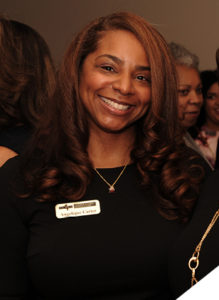 Most tax professionals appreciate the fact that no two days are exactly alike, and Angelique Carter, senior manager of income tax controversy at DISH Network Corporation, is no exception.
Most tax professionals appreciate the fact that no two days are exactly alike, and Angelique Carter, senior manager of income tax controversy at DISH Network Corporation, is no exception.
“After taking accounting classes, I found tax work to be more interesting than GL [general ledger] accounting, because it required a different flavor of critical thinking, analysis, planning, and defending a tax position,” she says. “There is also quite a bit of variety in the work. I generally don’t do the same thing from one day to the next, which keeps the work interesting.”
In the corporate tax world, Carter explains, “we have an opportunity to touch many different parts of the tax code. I’ve done employment tax, transaction tax, R&D, Section 199, partnership work, just to name a few. I enjoy the international tax work the most. I enjoy understanding how the treaties work, how they apply to transactions, and understanding compliance in different countries.”
What’s the most problematic tax law problem Carter has encountered since joining DISH?
“I think the most problematic issue I’ve dealt with is really the challenge the IRS has in applying its limited resources. The IRS continues to have limited staff to work audits. The Treasury isn’t going to stop collecting taxes anytime soon; businesses large and small would be best served by a better-funded IRS,” she says.
Carter clearly appreciates her tenure at DISH thus far. “The company has created many different business lines and has acquired several businesses,” she explains. “From the perspective of a tax person, this makes for interesting work and creates opportunities to learn about how tax would apply to the changes in the business. There is always an opportunity to learn something new.”
Working for State of Colorado
Carter also says she’s learned valuable lessons from her previous job working for the state of Colorado.
“I was a field auditor for the Colorado Department of Labor. The job required me to be very good at organizing and managing my time. I audited many small businesses—people who are not necessarily accountants. This required me to explain the law in a way that was understandable to nontax people, which necessitates a solid understanding of the law. Dealing with small businesses also helped me understand really how much at a disadvantage a small business [is] against a taxing authority. I was also able to transfer my knowledge and skills to my current role, working on the other side of the table. I understand the auditor’s job, which I believe helps me to navigate an audit better.”
Greatest Accomplishment
What does Carter regard as her greatest accomplishment?
“I would say recently it would have to be closing out our prior IRS audit. It was very long, as IRS audits tend to be nowadays. We were able to bifurcate agreed issues from unagreed issues using a minimum refund report to get refunds more quickly, which was beneficial to DISH. At some level, this request requires a good relationship with the audit team to facilitate, as it requires additional work on Exam’s part. While we still have more battles to fight, I’m glad we were able to accelerate a refund before the unagreed issues were resolved.”
When not involved with tax controversies, Carter enjoys riding horses (which she has done since middle school, and she currently owns a retired thoroughbred), hiking, and volunteer work. In addition to being a member of TEI, she is also a commissioner evaluating the performance of judges in Colorado’s Second Judicial District, which covers Denver. Finally, Carter is a diehard fan of The Simpsons. “I’ve been watching since the show started and will always watch, no matter how old I get.”
The TEI Experience
Speaking of TEI, here’s how Carter describes what TEI has meant to her: “When I first joined the Denver TEI chapter, I was just attending the CPE events. There was a request for volunteers to assist with planning an event, so I expressed interest. From there, additional leadership opportunities opened up (including chapter president). I think TEI has been great for me personally, because it’s provided an opportunity for me to hone my leadership skills in a very supportive way, thanks to the help from the current and prior members of the board.
“Furthermore, in my role as president, I’ve had an opportunity to think about how to lead an organization, develop goals, and determine how to execute on them, which is certainly transferable to my day job.”
Carter is at the tail end of the Gen-X demographic. She had an opportunity to hear a speech by Donna Lynne, Colorado’s lieutenant governor until earlier this year, who said something that stuck.
“I’m paraphrasing, but she said [that] you have to seek out leadership opportunities, even if it’s volunteering to lead a Girl Scout troop; the experience is transferable.”
Carter adds, “In our day jobs, there isn’t always an opportunity to lead. Volunteering with TEI can provide that opportunity; it helps to develop necessary leadership skills and creates mentorship relationships that are valuable when growing professionally.”



